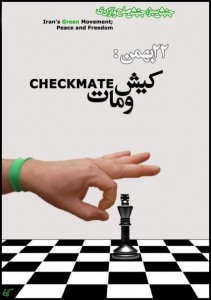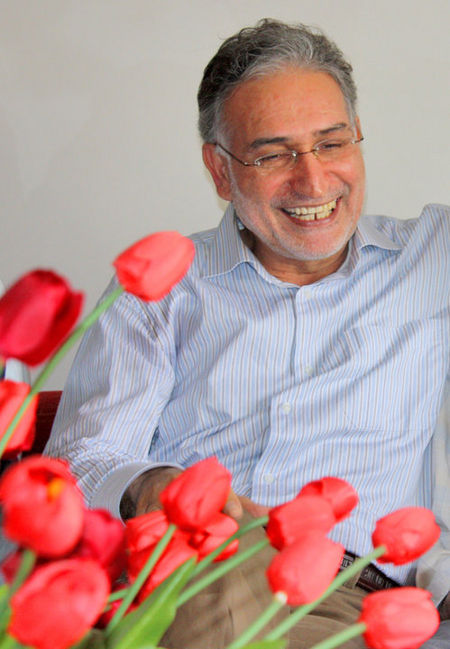The Latest from Iran (30 June): Assessing "Crisis"
 Wednesday, June 30, 2010 at 21:25
Wednesday, June 30, 2010 at 21:25  2025 GMT: Revelations from Evin Prison. Norooz publishes an account from Hossein Nouraninejad, a senior member of the Islamic Iran Participation Front, of a debate between political prisoners: "Many of us came to Evin with a strange illusion and a misguided sense of self confidence thinking our arrest was a misunderstanding that could be cleared thru debate with interrogators, only to realise later how wrong we were. [Journalist Emaduddin] Baghi used to tell us: 'Perhaps you did not expect to be treated this way because you did not know them, but I did."
2025 GMT: Revelations from Evin Prison. Norooz publishes an account from Hossein Nouraninejad, a senior member of the Islamic Iran Participation Front, of a debate between political prisoners: "Many of us came to Evin with a strange illusion and a misguided sense of self confidence thinking our arrest was a misunderstanding that could be cleared thru debate with interrogators, only to realise later how wrong we were. [Journalist Emaduddin] Baghi used to tell us: 'Perhaps you did not expect to be treated this way because you did not know them, but I did."NEW Iran Eyewitness: “Life Continues for People…With the Hope of Change” (Fatemeh)
NEW Iran Special: The Significance of the “Universities Crisis” (Verde)
Latest Iran Video: Harassment of Karroubi in Mosque (29 June)
Iran: Can the Green Movement Ally with Workers? (Maljoo)
Iran Snap Analysis: Waiting for the Crumbling?
The Latest from Iran (29 June): Grading the Supreme Leader
1745 GMT: Economy Watch. Iranian Labor News Agency, complementing witness accounts on EA, reports on concerns over rising food prices --- especially for chicken, other meat, and fruit --- as Iran approaches the holy month of Ramadan.
1545 GMT: Nuclear Discussions (cont.). EA contacts follow up on the item below, pointing us to a Wall Street Journal article, "Turkey Asks Iran to Return to Negotiating Table":
"If they do not sit down and talk, we will be in a worse situation this time next year," Turkish foreign ministry spokesman Burak Ozugergin told a press conference in Ankara, according to Turkish state news agency Anadolu Ajansi. "President Ahmadinejad mentioned August. We wish [the talks] would take place sooner."
Our contact gets to the point, "Seems someone's been talking to the Turks, getting them to put some pressure back on Iran."
1500 GMT: Resuming Nuclear Discussions? Two pieces of information pointing to a possible resumption of talks --- despite Mahmoud Ahmadinejad's declaration that he would "punish" the West with an embargo until late August --- on Iran's uranium enrichment.
Russian Foreign Minister Sergei Lavrov has said that Russia, France, and the US have proposed a UN-brokered meeting with experts from all three countries and Iran, provided Tehran stops enriching uranium to 20 percent.
Lavrov's declaration, made during a trip in Israel, follows indications that the Brazil, Turkish, and Iranian Foreign Ministers are meeting this week to consider their joint declaration on uranium enrichment.
1410 GMT: The Kahrizak Verdicts. Of 12 defendants in the closed-door trial over the post-election abuses and killings in Kahrizak Prison, two have been sentenced to death and nine have been given prison sentences.
1350 GMT: Message to Foreigners --- You May Be Bad, but Give Us Your Money (unless You're Israeli). A bit of posturing from the President, who has ordered the implementation of a bill mandating the identification of Israeli companies and institutions to impose a ban on Israeli products. The Iranian Foreign Ministry is required to put forward a proposal for the boycott of Israeli commodities at international meetings, including the Organization of the Islamic Conference and the Non-Aligned Movement.
More substantive is today's announcement, in Fars News, that the Government has eased restrictions on foreign banks seeking to do business in Iran.
1340 GMT: Satire of Day. Ebrahim Nabavi considers "Ten Paradoxes of a Revolution". An example? "Our people, who wished no foreign intervention during the Shah's time; now, after 30 years without foreigners, they urge all foreign institutions, the European Union, US, and UN to help them to get rid of this regime."
1250 GMT: Today's All-is-Well Alerts (cont.). Hamid Hosseini of Iran's Chamber of Commerce, Industries, and Mines has insisted that the Iranian bank accounts frozen by the United Arab Emirates do not belong to key traders.
The UAE's central bank has ordered that transactions of 41 bank accounts and the holdings of those individuals targeted by the new UN sanctions against Iran be suspended.
1245 GMT: Political Prisoner Watch (Revolving Door Edition). One leading teachers' union activist, Ali Akbar Baghani, has been released from jail; another two, Mokhtar Asadi and Mahmoud Bagheri, have been detained.
1142 GMT: The War Within. Rooz Online claims that the move to exclude Motalefeh, a key party in the Islamic Republic since 1979, has started because of its lack of support for the Government. The website also asserts that internal Revolutionary Guard bulletins are warning of the "menace of war".
1139 GMT: Make of This What You Will. According to Peyke Iran, 30% of those living in Tehran are depressed.
1135 GMT: Political Prisoner Watch. Interrogations of Mohsen Armin, former Deputy Speaker of Parliament and leading member of the Mojahedin of Islamic Revolution, continue after 41 days in detention.
1120 GMT: Today's All is Well Alerts. Press TV recycles the assurance, which we reported yesterday, by the head of the National Iranian Oil Distribution Company (NIODC), Farid Ameri, that "Iran is capable of meeting its gasoline needs under any circumstances without facing any difficulty".
The insistence comes amid news of more cut-offs of supplies by foreign oil companies.
And the head of the Atomic Energy Organization of Iran, Ali Akbar Salehi, says the country's first nuclear power plant will be inaugurated in the southern Iranian port city of Bushehr by late September: "Issuing resolutions against Iran will not have any effect as we are determined to continue with our plans," Salehi said.
Salehi said that a total of 3,000 Russian nuclear experts were working on the power plant and that the final tests for the inauguration of the facility were being conducted with only a two-week delay.
1115 GMT: The Hijab Pretext? RAHANA runs an analysis claiming that the increased enforcement of "proper" clothing is merely a pretext to put more security forces on the streets.
0855 GMT: Political Prisoner Watch. Yesterday we noted that the trial of Mahboubeh Karimi of the One Million Signatures Campaign had been scheduled for 29 June. It has now been put back to 9 July because of the absence of the judge.
Karimi's request for bail continues to be denied.
RAHANA reports increasing concern over the health of detained student leader Majid Tavakoli, who is "suffering from abdominal bleeding".
0850 GMT: Transmitting. The new "Green TV" has posted its provisional schedule.
0840 GMT: The Universities Crisis. Complementing the analysis of EA's Mr Verde, Deutsche Welle posts an article claiming that President Ahmadinejad is seeking to organise a "board meeting" of Islamic Azad University with his own representatives.
Iran's Prosecutor General Gholam-Hossein Mohseni Ejei is continuing to press the case for Presidential control, declaring that a judge's rulling supporting Parliament authority is invalid.
0835 GMT: Karroubi Follow-Up. Yesterday we posted the video of the Basiji harassment of Mehdi Karroubi in the mosque of Sharif University in Tehran.
Karroubi has issued a statement on his website, Saham News, concluding with the regret: "If we had one Shaaban Bimokh [a reference to Shaban Jafari, a particularly despised "enforcer" for the regime] during the Shah's times, this regime has brought up hundreds."
0825 GMT: Cyber-Warfare. Roshannews, a site for Iranian intellectuals, has been hacked shortly after its relaunch.
0820 GMT: Political Prisoner Watch. Ali Bikas, a member of the Student Committee for the Defense of Political Prisoners, has been released from prison.
Bikas, detained since 14 June 2009, had been given a seven-year prison sentence by the Revolutionary Court.
0803 GMT: Political Prisoner Watch. The Revolutionary Court of Mashhad has sentenced student Yasser Ghanei to five years' suspended imprisonment for "propaganda against the regime". One of the charges against Ghanei, who spent more than two weeks in solitary confinement, is that he recorded the results of the 2009 Presidential election and made them available online.
Ghanei still faces charges of insulting President Ahmadinejad.
Human rights activist Saied Kalanaki has also been sentenced to one year of imprisonment for propaganda against the regime and two years in prison for insulting the Supreme Leader.
0800 GMT: Rumour of Day. Aftab claims that Ahmadinejad's chief of staff, Esfandiar Rahim-Mashai said in a private meeting that he would accept the presidency of the Islamic Azad Universities.
0750 GMT: Corruption Watch. Member of Parliament Elyas Naderan, pressing his charges of corruption amongst President Ahmadinejad's advisors, has said that 1st Vice President Mohammad Reza Rahimi --- accused of involvement in an insurance fraud -- should be "sentenced like a common citizen".
0715 GMT: We begin this morning with two features. Mr Verde analyses the wider significance --- for the President, Parliament, and the Supreme Leader --- of the current battle over control of Islamic Azad University. A new correspondent, Ms Fatemeh, writes for EA about her recent, extended visit to Iran.
Meanwhile....
Execution Watch
Writing in The New York Times, Nazila Fathi features the growing campaign against the possible execution of a female Kurdish activist, Zeinab Jalalian, who is accused of membership in the separatist PKK>. Fathi includes the recent statement of Zahra Rahnavard and the activity of Jalalian's lawyer, Khalil Bahramian, who has never been allowed to meet with his client.
Political Prisoner Watch
Azeri student activist Yunis Sulaimani has been seized and taken to Tabriz, where a two-month detention order has been issued.
Parliament v. President
The fight over the Ahmadinejad budget is not over, it appears. Yesterday, we noted the expected approval by a Parliament commssion of the President's 5th Plan. However, Rah-e-Sabz, quoting reformist MP Nasrullah Torabi, reports that Government officials suddenly left the meeting of the commission.
Reformist Backing of Mousavi
The Mojahedin of Islamic Revolution has issued a statement supporting the "Green Charter" of Mir Hossein Mousavi and declaring that the message of the Green Movement is an answer to the unfulfilled goals of the Islamic Revolution.
 Ali Akbar Baghani,
Ali Akbar Baghani,  Ali Akbar Salehi,
Ali Akbar Salehi,  Anadolu Ajansi,
Anadolu Ajansi,  Atomic Energy Organization of Iran,
Atomic Energy Organization of Iran,  Brazil,
Brazil,  Burak Özügergin,
Burak Özügergin,  Deutsche Welle,
Deutsche Welle,  Ebrahim Nabavi,
Ebrahim Nabavi,  Elyas Naderan,
Elyas Naderan,  Emaduddin Baghi,
Emaduddin Baghi,  Esfandiar Rahim-Mashai,
Esfandiar Rahim-Mashai,  Farid Ameri,
Farid Ameri,  Fars News,
Fars News,  Hijab,
Hijab,  Hossein Nouraninejad,
Hossein Nouraninejad,  Iran,
Iran,  Iran Elections 2009,
Iran Elections 2009,  Islamic Azad University,
Islamic Azad University,  Islamic Iran Participation Front,
Islamic Iran Participation Front,  Islamic Revolution Guards Corps,
Islamic Revolution Guards Corps,  Kahrizak Prison,
Kahrizak Prison,  Khalil Bahramian,
Khalil Bahramian,  Mahboubeh Karimi,
Mahboubeh Karimi,  Mahmoud Ahmadinejad,
Mahmoud Ahmadinejad,  Mahmoud Bagheri,
Mahmoud Bagheri,  Majid Tavakoli,
Majid Tavakoli,  Mehdi Karroubi,
Mehdi Karroubi,  Mir Hossein Mousavi,
Mir Hossein Mousavi,  Mohammad Reza Rahimi,
Mohammad Reza Rahimi,  Mohsen Armin,
Mohsen Armin,  Mojahedin of Islamic Revoluton,
Mojahedin of Islamic Revoluton,  Mokhtar Asadi,
Mokhtar Asadi,  Motalefeh,
Motalefeh,  Mr Verde,
Mr Verde,  Ms Fatemeh,
Ms Fatemeh,  Nasrullah Torabi,
Nasrullah Torabi,  National Iranian,
National Iranian,  Nazila Fathi,
Nazila Fathi,  New York Times,
New York Times,  Norooz,
Norooz,  Peyke Iran,
Peyke Iran,  Press TV,
Press TV,  RAHANA,
RAHANA,  Roshannews,
Roshannews,  Russia,
Russia,  Saham News,
Saham News,  Saied Kalanaki,
Saied Kalanaki,  Sergei Lavrov,
Sergei Lavrov,  Shaban Jafari,
Shaban Jafari,  Turkey,
Turkey,  United Arab Emirates,
United Arab Emirates,  Yasser Ghanei,
Yasser Ghanei,  Zahra Rahnavard,
Zahra Rahnavard,  Zeinab Jalalian,
Zeinab Jalalian,  sanctions,
sanctions,  uranium enrichment in
uranium enrichment in  Middle East & Iran
Middle East & Iran 




